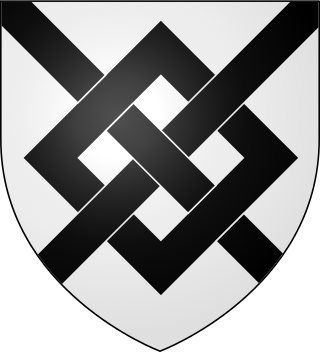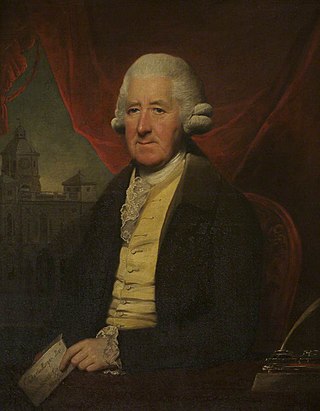Related Research Articles
William Morgan may refer to:

Baron Tredegar, of Tredegar in the County of Monmouth, was a title in the Peerage of the United Kingdom. It was created on 16 April 1859 for the Welsh politician Sir Charles Morgan, 3rd Baronet, who had earlier represented Brecon in Parliament. His eldest son, Charles Rodney Morgan, sat as Member of Parliament for Brecon, but predeceased his father. Lord Tredegar was therefore succeeded by his second son, the second Baron.

Thomas Morgan was a Welsh politician, of the Morgans of Tredegar. He was the eldest son of Thomas Morgan, Judge Advocate General of the Army, and his wife Jane Colchester.
William Morgan was a Welsh landowner and politician who sat in the House of Commons of England between 1659 and 1680.

William Morgan was a Welsh politician of the mid-18th century.

Thomas Morgan was a Welsh lawyer and politician who sat in the House of Commons from 1723 to 1769.

Charles Morgan "of Dderw" was a Welsh politician who sat in the House of Commons between 1763 and 1787.

John Morgan was a Welsh politician who sat in the House of Commons from 1769 to 1792.
Breconshire or Brecknockshire was a constituency in Wales which returned one Member of Parliament (MP) to the House of Commons of the English Parliament, and later to the Parliament of Great Britain and of the United Kingdom, between 1542 and 1918.
Sir John Wogan (1588–1644) was a Welsh politician who sat in the House of Commons at various times between 1614 and 1644.

Thomas Fanshawe, 1st Viscount Fanshawe KB was an English politician who sat in the House of Commons at various times between 1621 and 1661. He supported the Royalist cause in the English Civil War. Following the Restoration he was raised to the peerage.
Sir William Lewis, 1st Baronet of Llangorse, Brecon and Bordean House, East Meon, Hampshire, supported the Parliamentary cause during the English Civil War. He sat in the House of Commons variously between 1640 and 1677.
Sir Herbert Price, 1st Baronet was a Welsh politician who sat in the House of Commons at various times between 1640 and 1678. He fought on the Royalist side in the English Civil War.
Sir Poynings More, 1st Baronet (1606–1649) was an English politician who sat in the House of Commons at various times between 1624 and 1640.
Sir Thomas Tomkins JP was an English politician who sat in the House of Commons at various times between 1640 and 1674. He supported the Royalist cause in the English Civil War.
Sir Charles Williams (1591–1641) was a Welsh politician who sat in the House of Commons from 1621 to 1622 and from 1640 to 1641.
Sir William Morgan (1560–1655) was a Welsh politician who sat in the House of Commons of England in 1624 and 1625. He supported the Royalist cause in the English Civil War.
Sir Richard Lloyd was an English politician who sat in the House of Commons at various times between 1628 and 1676. He fought for the Royalist army in the English Civil War.

Sir Lionel Tollemache, 2nd Baronet PC, of Helmingham Hall in Suffolk, was twice elected as a Member of Parliament for Orford in Suffolk, in 1621 and 1628. He had a considerable reputation as a surgeon, but is said to have made many enemies due to his "immoderate temper".

Sir Charles Gould Morgan, 1st Baronet was an English Judge Advocate-General. From his birth until 1792 he was known as Charles Gould.
References
- 1 2 3 4 W R Williams The Parliamentary History of the Principality of Wales
- ↑ MORGAN, William (c.1600-1649), of Y Dderw, Llyswen, Brec. and the Middle Temple, London. Published in The History of Parliament: the House of Commons 1604-1629, ed. Andrew Thrush and John P. Ferris, 2010